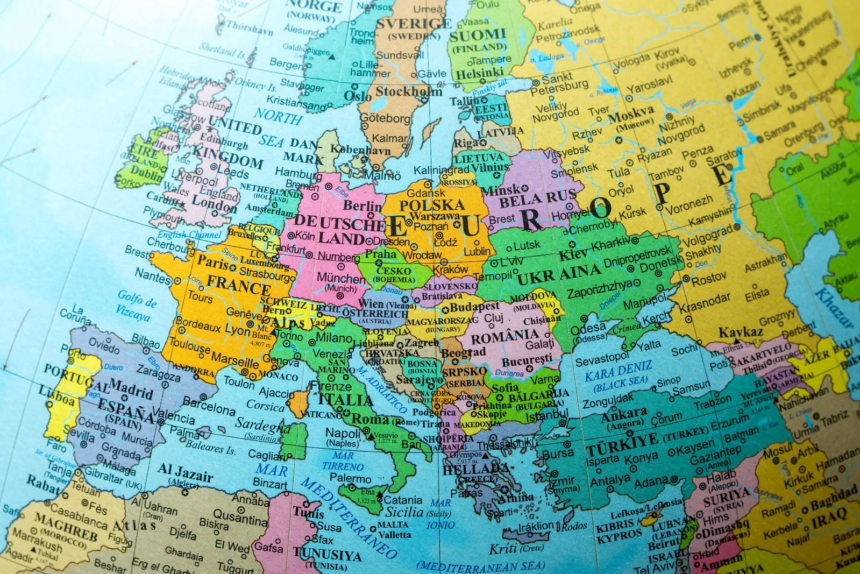Explore the captivating history and linguistic roots behind the enigmatic name “Europe.” Delve into the fascinating etymology that shaped the continent’s identity throughout centuries. Uncover the mysteries of its nomenclature.
Europe : Introduction
Delving deeper into Europe’s historical tapestry, its identity as a conceptual entity extends through centuries, leaving an indelible mark on the world’s collective consciousness. Predating contemporary debates on continental categorization, the ancient Greeks, pioneers of intellectual thought, delineated the known world into three pivotal segments: Europe, Asia, and Libya. The concept of this name, thus, precedes modern geopolitical discussions, underscoring its enduring significance. Amidst this historical backdrop, the lingering mystery persists: the origin of the name “Europe.” This inquiry beckons us to unravel linguistic nuances, cultural influences, and ancient narratives that have intricately woven together to christen this continent, fostering a deeper understanding of its enigmatic nomenclature.
ALSO READ : Meenakshi Temple : A Timeless Marvel Of Mythology, History, And Architecture

Linguistic perspectives
A fascinating linguistic theory proposing that the name “Europe” has a descriptive origin. Scholars dissect ancient Greek roots, combining “eurys” for “wide” and “ops” for “face” or “eye,” forming the term “wide-gazing.” This description vividly portrays the expansive European shoreline through the eyes of maritime Greeks, implying a connection to the mainland. The theory suggests that the name not only reflects the geographical breadth but also carries a perceptual element, emphasizing the significance of this name as a visually striking and central landmass. The term “wide-gazing” encapsulates the intricate blend of geography and perspective in the etymology of the name.
Explorers who ventured north reported vast mountain systems, expansive river basins, and distinct climates, revealing a landscape significantly different from the Mediterranean region. The term “wide-gazing” may have originated from the observations of these adventurous seafarers.

Akkadian influence
This linguistic theory delving into the etymology of “Europe” unveils a captivating link to the ancient Semitic Akkadian language spoken in Mesopotamia. Enthusiasts of this theory highlight the Akkadian term “erebu,” signifying “sunset,” as a pivotal element. From the Mesopotamian viewpoint, Europe is envisioned as the realm where the sun descends in the west, offering a poetic interpretation of its name.
Interestingly, this theory finds resonance in the naming of Asia, where the Akkadian “asu” denotes “sunrise.” In this Mesopotamian narrative, Europe and Asia are intrinsically connected, defined by the cyclical journey of the sun—Europe as the domain of its setting and Asia as the land where it rises—a linguistic tapestry weaving celestial symbolism into the geographical names of these continents.

Mythological roots
Delving into mythology, another compelling theory connects this name to the goddess Europa. In various ancient stories, Europa, one of the Oceanides, sea nymphs in Greek mythology, is identified as the eponym for the continent. Some versions link Europa to Demeter, the goddess of earth and agriculture. While the order of these names’ emergence remains uncertain, Europa, abducted by Zeus in the form of a white bull, is associated with the continent. She bore Zeus three sons, contributing to the mythical connection between the goddess and the land.

Conclusion
The origin of the name “Europe” remains an enigma, with linguistic, geographical, and mythological theories offering intriguing possibilities. Whether derived from the shipboard perspective of maritime Greeks, the sunset in Mesopotamia, or the mythical exploits of the goddess Europa, the name has endured through millennia, encapsulating the continent’s rich history and diverse landscapes. While the true origin may remain elusive, the name “Europe” stands as a testament to the enduring mysteries of human history and the complexities of linguistic and cultural evolution.

To explore more news : Click Here
ALSO READ : Ghost Forests : Silent Witnesses To Climate Change




































